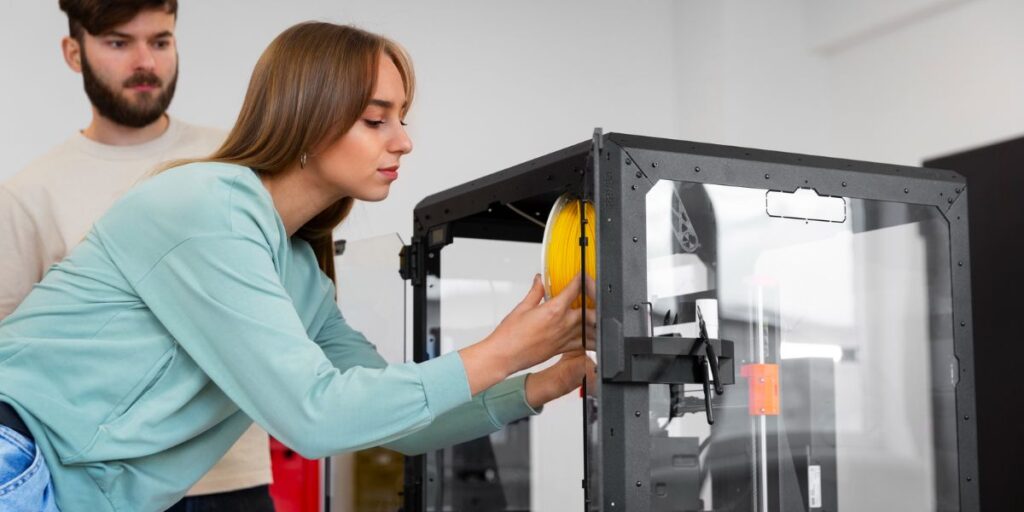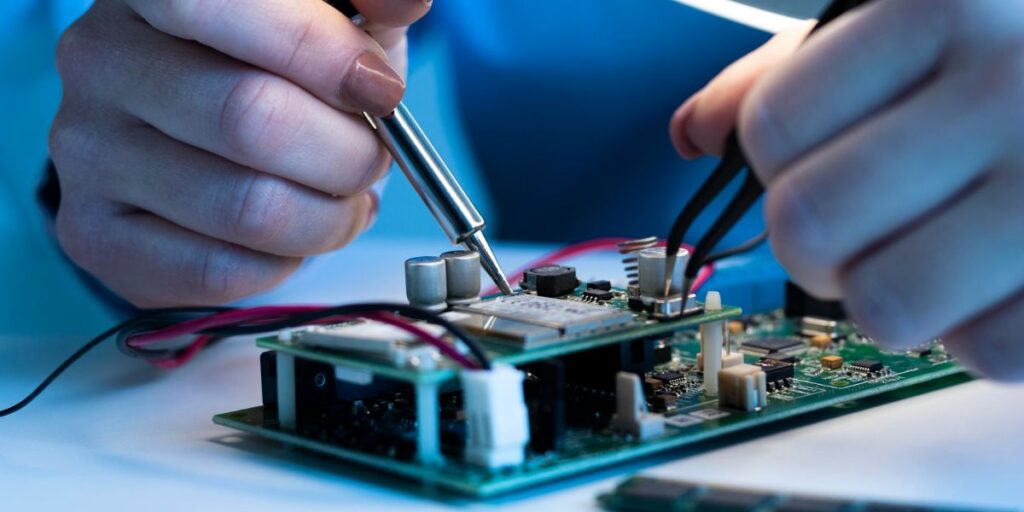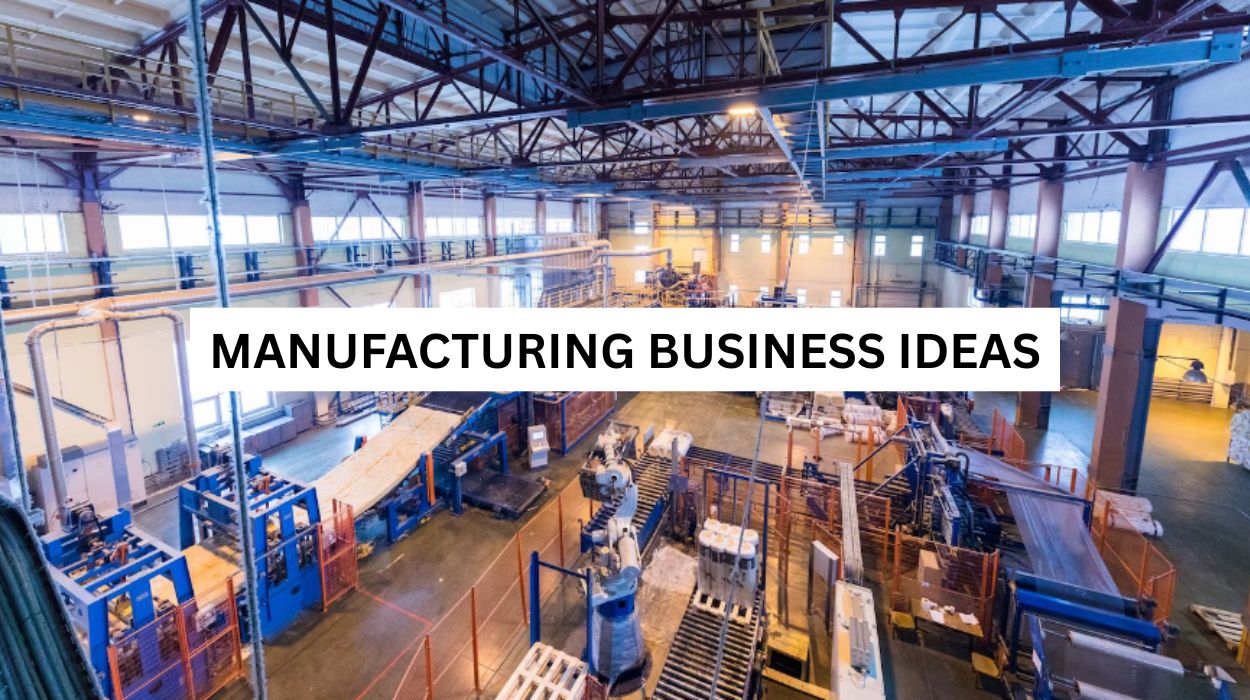The modern manufacturing industry offers a range of possibilities, from conventional manufacturing procedures to the latest digital production methods. The trick is to find a suitable manufacturing business idea that meets the market’s needs and aligns with your competency and resources. In this extensive guide, we shall look at some of the business manufacturing ideas that have potential in manufacturing in 2025 and beyond, and it is the information contained in this guide that will leave you with the implications of making an informed decision regarding your entrepreneurial choice.
The manufacturing industry is a great choice due to its resilience and flexibility, hence a good and long-term business venture to be ventured into by business owners. Manufacturing business ideas are at a wide range of investment levels and involve big-scale Industrial ventures to small-scale operations, which can be initiated at home. Knowing the available options will enable you to make the most appropriate decision in regard to your business dreams.
Factors to Consider Before Starting a Manufacturing Business
Capital Requirements and Financial Planning
Manufacturing companies usually take a lot of capital to start, as opposed to service-based firms. You should be ready to take into account the expenses of the equipment and raw materials, the renting or buying of the facility, the labor, utilities, and the working capital. It is important to come up with a comprehensive financial plan that will entail the startup costs as well as the expenses that may arise during the operations.
Market Research and Demand Analysis
Being knowledgeable about your target market is basic in selecting the appropriate manufacturing business ideas. Carry out extensive market research in order to find out the demand patterns, functional intensity of rivalry, pricing dynamics, and prospective customer groups. Examine how the industry performs in the of variations the industry in seasons, and how the industry is likely to grow in the future.
Regulatory Compliance and Legal Requirements
There are different regulations that have to be adhered to in manufacturing businesses depending on the industry and country. These can be in the form of environmental policies, safety measures, restrictions, quality accreditation, labor regulations, and specific needs of the sector. It is important to look at these obligations well in advance of your planning, as it will enable you to estimate the costs of being compliant and disregard some legal problems that may curtail your manufacturing ideas.
Technology and Innovation Considerations
Technology is playing an important role in modern manufacturing to enhance the economy, efficiency, and quality of products. Reflect on the ways the new technologies, such as automation, IoT, artificial intelligence, and sustainable manufacturing processes can influence the ideas of the manufacturing business that you have selected.
Supply Chain and Logistics Planning
Effective supply chain management is needed for successful ideas in manufacturing businesses. Analyze the supply of the raw material and its reliability, the transportation means, storage systems, and distribution channels. Take into consideration the geographical conditions, relations with suppliers, and possible shocks that are going to influence your performance.
Location and Infrastructure Requirements
The place where you have your manufacturing plant is also likely to play a major role in terms of your success. Take into account the geographical location of suppliers and customers, roads and rail transport, supply of public utilities, labor, and the involvement in existing local regulations. Home-based manufacturing business ideas would be good, whereas others would need their industrial units with other infrastructural needs.
Top 10 Manufacturing Business Ideas to Start in 2025
1. Food Processing and Packaging

The food processing industry is also growing at an accelerating rate since people are also demanding convenient foodstuffs, and healthy, and specialty food items. Such a manufacturing enterprise concept involves several opportunities, including the production of organic food, ethnic food, special foods, and even special diets.
The growing concern of wellness and health, mixed according to worldly lifestyle, causes great demand for processed and packaged products. The food processing manufacturing business ideas may include the simplest activities, such as production and packaging of nuts or dried fruits, to more complicated events such as cooking, preserving, and packaging of a full-course meal. The food business has fairly sustainable demand because food is something that people need and has the potential to be distributed at both local and regional levels.
- Startup Cost Analysis: Start-up cost varies between 88,30,000and 83,00,000, depending on the magnitude and equipment to be used.
- Market Potential: Successful health consciousness and convenience trends with the global food processing market having an anticipated value of 4.5 trillion by 2026.
- Required Skills: Food safety expertise, quality assurance, product sourcing, and regulation compliance.
- Equipment: Machinery used in processing food, packaging, refrigeration mechanisms, and quality testing mechanisms.
2. Eco-Friendly Product Manufacturing

The issue of awareness of the environment has generated a lot of demand for environmentally friendly products in different categories. The manufacturing business concept is to produce sustainable substitutes for conventional products, such as biodegradable packaging, objects that we can reuse inside the house, organic personal care products, and goods that cause little harm to the environment, such as cleaning clothes.
This is one of the most promising manufacturing business ideas in 2025 because increasing numbers of people are becoming aware of environmental problems as well as governmental bills supporting the maintenance of sustainability. Green production may take different directions, including working with both recycled materials as well as creating a biodegradable substitute for the existing products. The sustainable products market is still growing as consumers get increasingly environmentally conscious and do not mind paying top dollar to buy green products.
- Startup Cost Analysis: The cost of setup is normally between 12.45 lakhs to 62.25 lakhs and is based on the complexity of the product and the size of production.
- Market Potential: Niche market that exhibits remarkable growth with the green products market at the global scale is expected to reach a mark of 15.1 billion by 2027.
- Required Skills: Professional knowledge, having a background in environmental studies, sustainable sourcing of materials, compliance with regulations, and green marketing.
- Equipment: Sustainable producing equipment of eco-friendly material, testing equipment, and sustainable material packaging equipment.
3. 3D Printing Services and Products

The 3D printing technology has transformed the industrial world because products can be manufactured on demand and manufactured on demand, and the customization of the products, as well as the setup rates, are minimal. This manufacturing business concept is related to providing the business and consumers with the service of printing with the usage of 3D printing or the specific products that can be produced with the help of 3D printing technology.
They have been used in such applications as prototyping, custom component manufacture in place of machining, production of bespoke consumer goods, and architectural models. The manufacturing business application openings under 3D printing are: Rapid prototyping (services), custom manufacturing (individualized), product development (replacement parts), and consumer products. The flexibility of the technology is an advantage, hence enabling the manufacturers to cater to a wide variety of markets at low retooling costs, which proves helpful to entrepreneurs who are short of capital.
- Startup Cost Analysis: As the venture capital requires, the first investment is around 4,15,000 to 41,50,000, depending on the quality of equipment and the sphere of business.
- Market Potential: The market is growing at a fast rate, and the global 3D printing market is forecasted to hit the $76.17 billion mark by 2030.
- Required Skills: Skills in 3D design software, technical troubleshooting, customer service, and knowledge of material properties.
- Equipment: 3D printers, design software, post-processing machinery, and quality control equipment.
4. Handmade Crafts and Artisanal Products

The market for handmade crafts has been growing considerably because customers desire unconventional and original products, contrasting with mass-produced ones. This production company concept includes the production of crafts like handmade jewelry, individually made furniture, pottery, clothing, or decoration. The handmade nature of goods and associated customer hand feel and customization are worth an extra premium to the goods and bring about strong customer loyalty. To further boost growth, using platforms like Referral Rock can help leverage customer referrals to expand the business organically.
The advantage of the idea of a handmade manufacturing business is that artisan-made products are showing an increase in value, and there is a need to have special and personalized items. The registration of online e-commerce sites and social media has facilitated direct access to customers by artisans without having to switch to traditional retail platforms.
- Startup Cost Analysis: The approximate initial investment varies between 83,0000 to 12,45,000 by the kind and magnitude of craft.
- Market Potential: Fast-paced market with the global handicrafts market predicted to achieve a value of 1.2 trillion by the year 2026.
- Required Skills: Technical skills related to the field of craft, innovation in design, marketing, and customer relation skills.
- Equipment: The type of equipment used consists of hand tools and simple machines adapted to the type of craft and work space requirements.
5. Textile and Apparel Manufacturing

There are varied manufacturing business concepts in the textile and apparel industry, such as the production of specialty fabrics and production of custom clothes. This industry has such opportunities as sustainable fashion, technical textiles, bespoke embroidery and printing, and niche clothing. The increased need for customization and sustainable fashion opens up new opportunities that allow smaller manufacturers to compete with larger enterprises successfully.
Business ideas in textile manufacturing may be targeted in numerous directions in the industry, such as fabric production, garment manufacturing, and specialty finishing services, among others. The increasing popularity of fast fashion has resulted in demand for quick manufacturing services, whereas the trend of sustainability has created a requirement for environmentally friendly textiles at low costs and ethical production.
- Startup Cost Analysis: Under this head, the initial investment is between 20,75,000 to 1,66,00,000, depending on whether the expertise is specialization and the level of business.
- Market Potential: A huge developed market where the global textile market is estimated at around 1.7 trillion dollars every year.
- Required Skills: Knowledge of fashion design, supply chain management, quality control, and knowledge of textile technologies.
- Equipment: Sewing machines, cutting gears, pressing gears, and specialized textile gears.
6. Electronics Components and Assembly

The electronics industry still grows at a rapid pace, and this is due to the growing needs of consumers’ electronic gadgets, IoT devices, and technological advancements. The manufacturing business concepts in this industry involve electronic component manufacturing, assembly service business, or manufacturing of specialized electronics.
Electronic devices are becoming more complicated, and the process leaves room for specialized manufacturers that are able to support the quality of the components and assembly services. The sphere of electronics manufacturing business ideas may depend on the diversity of tasks, and it may range from simple component production to sophisticated tasks such as circuit board assembly and testing. The industry enjoys steady growth in demand and an endless stream of new technologies that make special manufacturing skills a source of competitive advantage.
- Startup Cost Analysis: The cost of the startup is generally between 41,5,00,000 and 4,15,00,000 based on the level of complexity and degrees of automation.
- Market Potential: Increasing market as 2028 market is estimated at 1.4 trillion dollars of the electronics manufacturing services market.
- Required Skills: Technical knowledge in both electronics issues and quality control, supply chain management, and regulatory compliance.
- Equipment: Assembly equipment, testing instruments, soldering facilities, and clean room equipment.
7. Automotive Parts Manufacturing

The development of the car industry to an environmentally friendly electric car and advanced technologies offers a wide field for new business ideas in the manufacturing industry. This industry comprises manufacturing substitutes, special parts, aftermarket parts, and electric vehicle parts. The nature and the scope of the automotive industry have many niche opportunities that can be exploited by specialized manufacturers.
The business ideas related to automotive manufacturing can be concerned with different areas of the industry, including conventional parts to replace the previous models and the advanced parts of electric cars. The transition of the industry towards sustainability and electrification opens new possibilities for manufacturers that work out innovative solutions.
- Startup Cost Analysis: The start-up requirements vary between 62,25,000 to 83,00,00,000 (depending upon the complexity of the parts and the volume of production).
- Market Potential: The size of the market is large, and the estimated global market size of automotive parts is about $400 billion per annum.
- Required Skills: Skills in engineering, quality control, compliance, and automotive system knowledge.
- Equipment: Machinery equipment, testing equipment, quality control, and special automotive manufacturing machinery.
8. Health and Wellness Products

The sector of health and wellness is a rapidly growing field because consumers pay more and more attention to their physical and mental health. Some manufacturing business concepts in this industry are the manufacture of diet supplements, fitness gear, wellness gadgets, and health-centered consumer items. Greater awareness of health and aging populations provides a steady need for new health and wellness products.
The ideas of health and wellness manufacturing business may vary and include the manufacturing of simple supplements to complicated medical devices. The sector is supported by an increasing demand on the part of consumers who are becoming aware of health concerns and who are ready to spend on products that help them attain health. To succeed in this market, there must be a concept of meeting regulatory requirements, nurturing quality standards, as well as telling the consumers about the benefits of products.
- Startup Cost Analysis: Upfront investment usually amounts to 24,90,000 or 2,49,00,000, depending on the kind of product and regulatory structure.
- Market Potential: The market is growing rapidly, and the global health and wellness market is expected to reach 1.5 trillion by 2026.
- Required Skills: Knowledge of regulatory compliance, quality control, product development, and knowledge of the health industry.
- Equipment: Equipment used in manufacturing, depending on the type of products, quality testing equipment, and packaging equipment.
9. Home Improvement and DIY Products

There has been immense growth in the home improvement market, where the owners are willing to renovate and maintain their homes. The ideas of manufacturing businesses in this sector are the manufacture of tools, hardware, building materials, and DIY kits. The rise of popularity in home improvement shows and online tutorials have made the consumer more interested in DIY projects, which in turn has compelled the need for specialized products and tools.
Ideas for home improvement manufacturing business may be concentrated on the simple production of hardware or some innovative DIY solutions. The industry enjoys steady demand because of activities in the housing industry as well as the need to repair and upgrade homes. Any business in this sector needs to be aware of consumer needs, quality standard maintenance, as well as design products that can make DIY easier.
- Startup Cost Analysis: The initial start-up costs are between 1660000 and 1245000 based on the complexity of the product and the scope of the market.
- Market Potential: Large, stable market with the home improvement market (worldwide) of about 850 billion dollars per year.
- Required Skills: The skills that are required are product design, quality control, knowledge of building codes and safety rules, and knowledge of the retail market.
- Equipment: Production devices of a specific type of goods, testing apparatuses, and wrapping machines.
10. Personal Care and Cosmetics

The personal care and cosmetics industry is still growing due to the growing awareness of people about their appearance and personal care. Examples of manufacturing ideas in this sector are the production of skincare products, cosmetics, hair care, and special personal care products. The concentration on natural and organic within the industry provides an opportunity for the manufacturers if they are able to come up with effective, clean formulations.
The manufacturing business that one can have in the field of personal care can be as simple as the formulation of a simple product, and as sophisticated as manufacturing cosmetic products. A steady demand and the constant availability of new trends and ingredients are the advantages of the industry. In order to be successful in this sector, one must learn the preferences of the consumers, have good quality products, and meet the regulations of the cosmetic department.
- Startup Cost Analysis: the amount of initial outlay tends to be anything between 12,45,000 and 83,00,000 on the basis of the complexity and scale of the product.
- Market Potential: The global personal care market is expected to be worth 716 billion in 2025.
- Required Skills: skills in product formulation, regulation compliance, quality control, and marketing.
- Equipment: Mixers, filling machines, testing equipment, and packaging machines.
Sales and Marketing Strategies for Manufacturing Companies
Digital Marketing and Online Presence
In this era of the internet, manufacturing business ideas requires a powerful online presence. This involves the development of a business online presence where your products, abilities, and company history can be illustrated. SEO assists would-be customers in locating your business in search of the relevant products or services. Investing in a monthly backlinks service through marketing sites for guest posting can further strengthen your SEO efforts, improving domain authority and search rankings over time.
Trade Shows and Industry Events
The trade shows and the industry projects can be considered as a good option for marketing a manufacturing business idea. These events give them chances to display their products, connect with potential customers in the flesh, and stay up to date with the industry. Trade shows are an opportunity that enables manufacturers to demonstrate their functionality, establish client relations with distributors and retailers, and establish leads through which sales are to be made in the future.
Wholesale Distribution Arrangements
Direct sales strategies are most suitable for many business ideas of manufacturing businesses, especially in B2B markets. This entails establishing relationships with your customers who are the key, knowing their needs on a personal basis, and offering a special solution. Direct sales also need qualified salespeople who are technical about how your products work and who also know how to communicate their advantages to the prospective customer.
Customer Relationship Management
Keeping the relationships with current customers in good standing is one of the key factors that lead to manufacturing business ideas. This is known as excellent customer service, good quality products, and an endless search for feedback to do better in your products and services. Using customer relationship management (CRM) systems allows following up on the interactions and orders as well as recognizing the possibilities of further sales.
Pricing Strategies Value Proposition
The manufacturing business concepts are essential in the formulation of efficient pricing strategies. This should include comprehending your costs, the prices of your competitors, as well as the perceptions of customers regarding their values. Value-based pricing is all about having value added to your products, which sell in terms of the value added by they add to customers instead of just covering costs and giving a margin on it. The strategy may be used to support high prices of high-quality products or products considered to be innovative.
Conclusion
The manufacturing industry is a great field where entrepreneurs who are ready to spend their time and resources in developing successful businesses enjoy a lot of opportunities. The different manufacturing business ideas that this guide will present are but a small fraction of what can be done in the current dynamic marketplace. Manufacturing companies must be planned well, the entity must have sufficient capital, they must understand the market, as well as the will to make quality products and attend to their customers.
In searching out manufacturing ideas, pay attention to serving unmet market segments, generating distinctive value propositions, and creating robust operational capabilities. The manufacturing sector favors those business entities able to continually provide quality products, to carry on effectively, and to be able to embrace the new environments in the market. Manufacturing ideas can offer a good source of entrepreneurial success and long-term wealth creation when the same is well-planned and executed.
FAQs
What is the minimum capital required to start a manufacturing business?
The amount of money that you need as capital is very small for the kind of manufacturing business that you want. Some of the simple manufacturing business ideas, such as handmade crafts or small food processing, need just 83,000 to 4,15,000 rupees, whereas complex manufacturing like electronics manufacturing or even automotive parts may need 415000 to 4150000 rupees or even more. What needs to be done is that one should thoroughly check out the particular business needs such as equipment, facility, inventory, and the working capital requirement.
How long does it typically take to establish a profitable manufacturing business?
The business idea of most of the manufacturing businesses takes about 6 to 18 months before the business attains profitability, which might take a long time depending on various factors like the sector, amount invested, the market structure, and implementation of the business. Low-cost and simple manufacturing processes can realize profits in 3 to 6 months, whereas complex manufacturing industries are unlikely to achieve profitability in less than 2 to 3 years.
What are the most important licenses and permits needed for manufacturing businesses?
There are usually various kinds of licenses and permits needed by businesses of a manufacturing nature, although they differ by industry types and by territories. General requirements are business permits, production permits, environmental permits, health and safety standards, and industry-specific approvals. There are FDA registration and local health department permits for food manufacturing, FCC compliance, and export licenses that may be required in electronics manufacturing.
How can I find reliable suppliers for raw materials and components?
One of the most important steps in manufacturing business ideas is to find out good suppliers, and they need to be researched and evaluated systematically. Suppliers could be identified by referring to the industry directories, trade fairs, online platforms, or recommendations by other manufacturers, and their evaluation should be based on the quality standard parameters as well as prices, delivery lead time, minimum order quantities, payment terms, and financial viability. References should also be obtained and samples taken in order to test the quality and the level of service of other customers. It is perhaps good to have two or more suppliers on board to spread the risk and make the supply steady.
What are the best ways to scale a manufacturing business once it’s established?
Expansion of manufacturing enterprises requires planning and taking corresponding steps to maintain the implemented process coherent across a wide range of spheres. Some of the commonly used methods of scaling up are expansion of the product line, reaching out to new markets, improving production capacity, and optimizing the efficiency of the operations. Technology and automation planning can increase productivity and save labor costs. It has to have good systems and management processes to develop growth in quality and efficiency.

